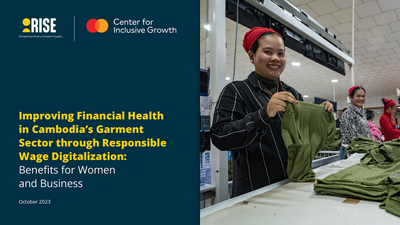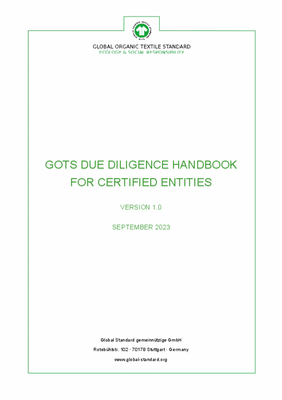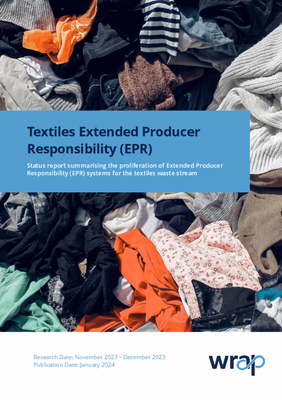Why Fashion Needs to ‘Double Down’ on Reducing Virgin Synthetics
One way to help the fashion industry reduce its emissions in line with the 1.5-degree Celsius pathway? Making the right material choices, according to Textile Exchange.
View
| External Site
 Asia Garment Hub
|
December 05, 2023
Asia Garment Hub
|
December 05, 2023
Our Take On Fashion’s Forecast for 2024
We pick up three key themes from McKinsey's State of Fashion 2024 report, analysing AI’s pervasive influence in the industry; the climate emergency and fashion’s future with sustainability; and how brands, retailers and suppliers can prepare for fashion’s economic outlook for the...
View
| External Site
 Asia Garment Hub
|
December 05, 2023
Asia Garment Hub
|
December 05, 2023
Surge in interest for Digital Product Passport ahead of mandate
New research shared by the blockchain and web3 solutions developer, Protokol, claims there is a surge in interest for the upcoming regulation mandating Digital Product Passports (DPPs), with its media coverage up 413% compared to the same period last year.
View
| External Site
 Asia Garment Hub
|
December 05, 2023
Asia Garment Hub
|
December 05, 2023
COP28 call on fashion brands and lawmakers
The Fashion Revolution initiative is calling on fashion brands to set robust climate targets in consultation with their suppliers and on policymakers to hold them to account on decarbonisation. The call to action was issued to coincide with the COP28 climate summit in Dubai which...
View
| External Site
 Asia Garment Hub
|
December 05, 2023
Asia Garment Hub
|
December 05, 2023
Fashion brands putting millions of workers at risk with gaps on human rights and gender equality, shows new research
The World Benchmarking Alliance (WBA) assessed 55 of the world’s most influential apparel companies, including Adidas, Fast Retailing, Kering, SHEIN, and VF Corporation, in its 2023 Corporate Human Rights Benchmark and Gender Benchmark.
View
| External Site
 Asia Garment Hub
|
November 22, 2023
Asia Garment Hub
|
November 22, 2023
Improving Financial Health in Cambodia’s Garment Sector through Responsible Wage Digitalization: Benefits for Women and Business
This report sets out the results from RISE supporting 17 garment factories in Cambodia with over 25,000 workers (85% women) with wage digitalization, and enabling workers to access, use and benefit from their accounts.
View
|
Full View
|
Download
 RISE: Reimagining Industry to Support Equality
|
November 23, 2023
RISE: Reimagining Industry to Support Equality
|
November 23, 2023
Legislation is coming for fashion’s supply chains. Are you ready?
This year is set to be a tipping point for fashion’s supply chains, as brands and suppliers race to comply with incoming legislation and meet 2025 sustainability goals.
View
| External Site
 Asia Garment Hub
|
January 10, 2024
Asia Garment Hub
|
January 10, 2024
Fashion’s Carbon Countdown: Rethinking Overproduction
Overproduction has been fashion’s constant companion for years. For a long time, overproduction was financially feasible due to (inhumanely) cheap raw materials, labour, and transport. Combined with high mark-ups, fashion found a way to make overproduction profitable, albeit at a...
View
| External Site
 Asia Garment Hub
|
January 10, 2024
Asia Garment Hub
|
January 10, 2024
2024 Fashion Trends: Sustainability, Individuality, and Ethical Practices Take Center Stage
As we usher in 2024, the fashion industry is embracing a significant shift towards sustainability, individuality, and innovation, marking a departure from the fast-fashion trends of the past. A
View
| External Site
 Asia Garment Hub
|
January 10, 2024
Asia Garment Hub
|
January 10, 2024
What Bangladesh can do to protect the rights of migrant workers in destination countries
The Ministry of Expatriate Welfare and Overseas Employment requires enhanced human resources and increased capacity to provide robust assistance to distressed migrant workers in destination countries
View
| External Site
 Asia Garment Hub
|
January 10, 2024
Asia Garment Hub
|
January 10, 2024
The Impact of the Earthquake on Textile and Garment Workers
Interviews with 100+ workers in this January 2024 report by CCC Turkey shows that garment factories and their buyers left workers to fend for themselves after the devastating earthquake that hit Türkiye in February 2023. As most of them were not paid in full in the aftermath of...
View
| External Site
 Asia Garment Hub
|
January 10, 2024
Asia Garment Hub
|
January 10, 2024
Circle Economy study: How to combat the steadily falling global circularity rate
Together with business consultancy Deloitte, global impact organisation Circle Economy Foundation has published its “Circularity Gap Report 2024” today, which highlights how the global circularity rate is currently falling from 9.1 percent to 7.2 percent despite the number of...
View
| External Site
 Asia Garment Hub
|
January 27, 2024
Asia Garment Hub
|
January 27, 2024
Texworld NYC: Experts Say Sourcing Could Be on Course for ‘Catastrophe’
In a candid conversation moderated by Sourcing Journal founder Edward Hertzman at Texworld New York City on Tuesday, experts discussed the uncertainty the industry faces in the year ahead.
View
| External Site
 Asia Garment Hub
|
January 27, 2024
Asia Garment Hub
|
January 27, 2024
Gots Due Diligence Handbook For Certified Entities
The GOTS Due Diligence Handbook for Certified Entities is based on the recognised international frameworks, including the OECD Due Diligence Guidance for Responsible Supply Chains in the Garment and Footwear Sector (2018) and the UN Guiding Principles on Business and Human Rights...
View
|
Full View
|
Download
 Global Organic Textile Standard (GOTS)
|
January 30, 2024
Global Organic Textile Standard (GOTS)
|
January 30, 2024
Textiles Extended Producer Responsibility (EPR)
Status report summarising the proliferation of Extended Producer Responsibility (EPR) systems for the textiles waste stream
View
|
Full View
|
Download
 Asia Garment Hub
|
January 30, 2024
Asia Garment Hub
|
January 30, 2024
Why top apparel brands fall short in supplier partnerships
Improving supply chain working conditions requires clarity of expectations and accountability on both sides.
View
| External Site
 Asia Garment Hub
|
January 29, 2024
Asia Garment Hub
|
January 29, 2024
Trade union formation to become easier
Conditions mandatory to form trade unions will be eased through the upcoming amendment to Bangladesh Labour Act, in a bid to comply with recommendations from Western communities, particularly the European Union (EU) and the United States.
View
| External Site
 Asia Garment Hub
|
January 29, 2024
Asia Garment Hub
|
January 29, 2024
NIT-Warangal faculty members develop innovative wastewater treatment system for textile industry effluents
While the textile industry helps many across the state earn their livelihoods, the chemical effluents from the units affect the lives of people living in the vicinity. To address this, a team of faculty members at the National Institute of Technology, Warangal (NIT-W), has...
View
| External Site
 Asia Garment Hub
|
January 29, 2024
Asia Garment Hub
|
January 29, 2024



